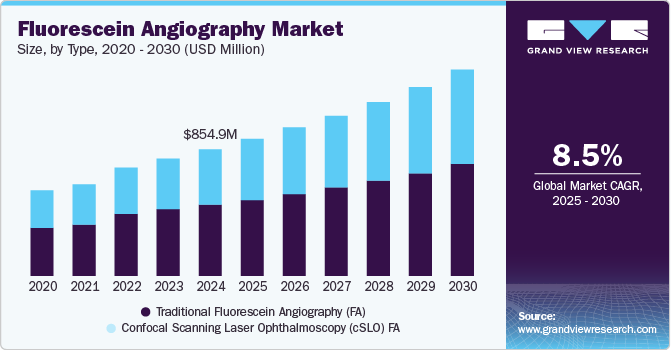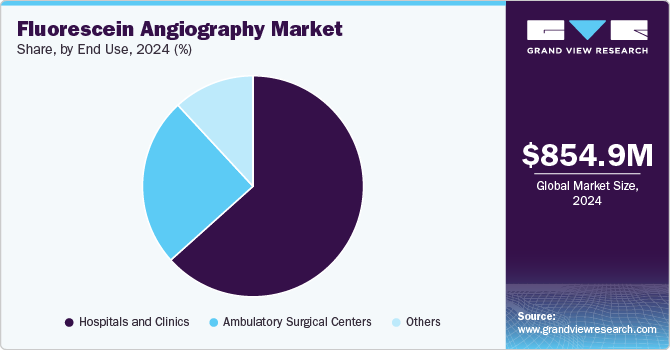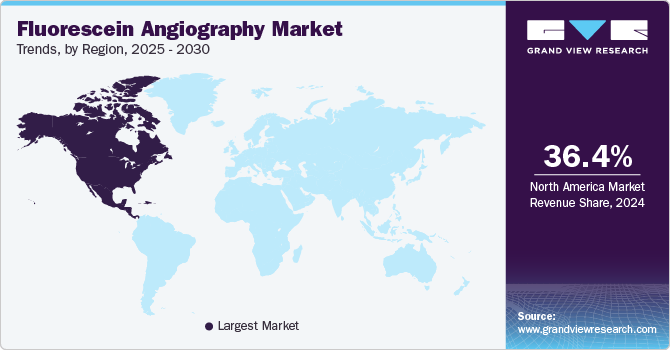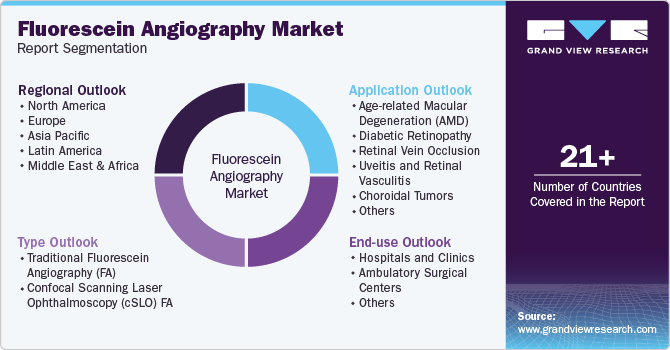- Home
- »
- Medical Devices
- »
-
Fluorescein Angiography Market Size & Share Report, 2030GVR Report cover
![Fluorescein Angiography Market Size, Share & Trends Report]()
Fluorescein Angiography Market (2025 - 2030) Size, Share & Trends Analysis Report By Type (Traditional Fluorescein Angiography), By Application (Age-related Macular Degeneration), By End Use, By Region, And Segment Forecasts
- Report ID: GVR-4-68038-554-0
- Number of Report Pages: 100
- Format: PDF
- Historical Range: 2018 - 2023
- Forecast Period: 2025 - 2030
- Industry: Healthcare
- Report Summary
- Table of Contents
- Interactive Charts
- Methodology
- Download FREE Sample
-
Download Sample Report
Fluorescein Angiography Market Trends
The global fluorescein angiography market size was valued at USD 854.9 million in 2024 and is expected to grow at a CAGR of 8.5% from 2025 to 2030. This growth is attributed to the increasing prevalence of eye diseases, particularly diabetic retinopathy and macular degeneration. In addition, the demand for early diagnosis and advancements in imaging technology, such as digital fundus cameras, enhance diagnostic accuracy. Furthermore, government initiatives aimed at reducing blindness and raising awareness also contribute to market expansion. Moreover, the aging population worldwide is expected to amplify the need for these diagnostic procedures.

The fluorescein angiography market is witnessing robust growth due to several interconnected factors. A notable increase in eye-related diseases, such as diabetic retinopathy and macular degeneration, propels demand for this diagnostic technique. Governments are also playing a crucial role by implementing initiatives that promote the use of fluorescein angiography, thereby enhancing access to early detection and treatment options. Additionally, favorable insurance policies create opportunities for wider adoption of these technologies.
Investment in healthcare infrastructure is another significant driver, as rising healthcare expenditures allow for medical facilities and equipment improvements. This is complemented by global campaigns such as WHO's VISION 2020, which aims to raise awareness about blindness and encourage long-term commitments from governments to combat this issue. Such initiatives highlight the necessity of allocating resources effectively to address eye health challenges.
Furthermore, the market is boosted by advancements in imaging technology, which improve diagnostic accuracy and patient outcomes. The increasing prevalence of chronic conditions, particularly diabetes, further underscores the need for effective diagnostic tools like fluorescein angiography. As healthcare systems evolve and prioritize eye care, the market is set to expand significantly, driven by both public health initiatives and technological innovations.
Type Insights
Traditional fluorescein angiography dominated the market and accounted for the largest revenue share of 56.4% in 2024, attributed to the rising incidence of eye diseases, particularly diabetic retinopathy and age-related macular degeneration. Furthermore, the increasing emphasis on early diagnosis and treatment options enhances its relevance in clinical practice. Moreover, advancements in imaging technology improve the accuracy and efficiency of traditional fluorescein angiography, making it a preferred choice among healthcare professionals.
Confocal scanning laser ophthalmoscopy (cSLO) is expected to grow at a significant CAGR of 9.4% over the forecast period, driven by technological advancements that enhance imaging capabilities. In addition, cSLO's ability to provide high-resolution images and detailed visualization of retinal structures makes it invaluable for diagnosing various eye conditions. Furthermore, the growing prevalence of retinal diseases and the demand for non-invasive diagnostic techniques contribute to its adoption. Moreover, integrating artificial intelligence in cSLO systems is expected to improve diagnostic accuracy and streamline workflows in ophthalmic practices.
Application Insights
The age-related macular degeneration (AMD) application held the dominant position in the market, with the largest revenue share of 32.6% in 2024, owing to the increasing prevalence of this condition among the aging population. In addition, age-related macular degeneration is a leading cause of vision loss, particularly in older adults, necessitating effective diagnostic tools for early detection and management. Furthermore, advancements in imaging technology enhance the accuracy of diagnoses, further supporting the adoption of fluorescein angiography in clinical settings focused on AMD management.
Diabetic Retinopathy is expected to grow at a CAGR of 9.3 from 2025 to 2030, driven by the rising incidence of diabetes globally. As diabetes becomes more prevalent, the associated risk of diabetic retinopathy increases, creating a demand for reliable diagnostic methods. In addition, fluorescein angiography is essential for detecting early signs of retinopathy and monitoring disease progression, making it invaluable for ophthalmologists. Furthermore, government initiatives to improve diabetes care and awareness contribute to the market's expansion by promoting early diagnosis and treatment options through advanced imaging techniques like fluorescein angiography.
End Use Insights
The hospitals and clinics segment led the market and accounted for the largest revenue share of 63.9% in 2024 attributed to the increasing prevalence of eye diseases, particularly among the aging population. Hospitals and clinics serve as primary healthcare providers for patients requiring diagnostic imaging, making them essential in detecting and treating conditions like diabetic retinopathy and age-related macular degeneration. Furthermore, advancements in imaging technologies and government initiatives to improve eye care services drive the demand for fluorescein angiography in these settings as healthcare facilities strive to enhance patient outcomes.

Ambulatory surgical centers (ASCs) are expected to grow at a CAGR of 9.4% over the forecast period, owing to their focus on providing efficient and cost-effective outpatient services. ASCs offer a convenient alternative for patients needing diagnostic procedures without the extended wait times often associated with hospitals. Furthermore, the rising demand for minimally invasive procedures and the growing emphasis on early diagnosis of eye diseases contribute to the popularity of fluorescein angiography in these centers. Moreover, favorable reimbursement policies and increasing investments in ASC infrastructure are expected to enhance their role in delivering high-quality ophthalmic care, thereby boosting market growth.
Regional Insights
The fluorescein angiography market in North America dominated the global market and accounted for the largest revenue share of 36.4% in 2024 attributed to the high prevalence of eye diseases, particularly diabetic retinopathy, which affects millions of individuals. In addition, the region boasts advanced healthcare infrastructure and a strong emphasis on early diagnosis, leading to increased utilization of fluorescein angiography. Furthermore, government initiatives aimed at preventing blindness and enhancing public awareness about eye health further bolster market growth.

U.S. Fluorescein Angiography Market Trends
U.S. fluorescein angiography market dominated the North American market and accounted for the largest revenue share in 2024, driven by the increasing number of diabetic patients and the projected rise in diabetic retinopathy cases. Furthermore, favorable insurance policies and reimbursement structures encourage healthcare providers to adopt fluorescein angiography as a standard diagnostic procedure. Moreover, combining a robust healthcare system and a growing elderly population is a crucial factor driving the market growth.
Asia Pacific Fluorescein Angiography Market Trends
The fluorescein angiography market in the Asia Pacific is expected to grow at a CAGR of 9.2% over the forecast period, owing to rising awareness about eye health and increasing healthcare expenditure. In addition, the growing prevalence of diabetes and age-related eye diseases in countries such as India and Japan is propelling demand for advanced diagnostic techniques. Furthermore, government initiatives to improve healthcare access and quality foster an environment conducive to market growth. Moreover, the increasing adoption of innovative imaging technologies further enhances the capabilities of fluorescein angiography in diagnosing various retinal disorders.
China Fluorescein Angiography Market Trends
China fluorescein angiography market held the dominant position in the Asia Pacific market, driven by a rapidly aging population and an increase in chronic diseases such as diabetes. In addition, the Chinese government has invested heavily in healthcare infrastructure, facilitating better access to advanced diagnostic tools like fluorescein angiography. Furthermore, rising public awareness regarding eye health and government campaigns to reduce vision impairment contribute to the growing demand for these diagnostic procedures. Moreover, integrating cutting-edge imaging technologies enhances diagnostic accuracy, further supporting market expansion.
Europe Fluorescein Angiography Market Trends
The fluorescein angiography market in Europe is fueled by an increasing incidence of eye diseases and an aging population. Countries like Germany and France are implementing comprehensive healthcare policies prioritizing early diagnosis and treatment of retinal disorders. Furthermore, advancements in imaging technology are making fluorescein angiography more accessible and efficient for healthcare providers. Moreover, collaborative efforts between governments and healthcare organizations to raise awareness about eye health issues drive regional market growth.
Germany Fluorescein Angiography Market Trends
The growth of Germany fluorescein angiography market is driven by a well-established healthcare system that supports advanced diagnostic procedures. In addition, the country's focus on research and development in ophthalmology contributes to innovations in imaging technology, enhancing diagnostic capabilities. Furthermore, Germany's aging population is leading to an increased prevalence of age-related macular degeneration and diabetic retinopathy, thereby driving demand for effective diagnostic solutions. Moreover, government initiatives to improve eye care services further support the growth of the fluorescein angiography market within the country.
Key Fluorescein Angiography Company Insights
Some of the key players in the market include Carl Zeiss Meditec, Inc., NIDEK Co., Ltd., Kowa Company Ltd., and others. These companies are implementing various strategies to enhance their competitive edge. These include launching innovative products to meet evolving customer needs, forming strategic partnerships to expand market reach, and pursuing mergers and acquisitions to consolidate resources and capabilities. In addition, companies focus on enhancing distribution networks and investing in research and development to drive product innovation and improve service delivery.
-
Carl Zeiss Meditec, Inc. manufactures the CLARUS 700, an ultra-widefield retinal imaging system that combines multiple imaging modalities, including fluorescein angiography, to provide high-resolution retina images. Operating within the medical technology segment, Zeiss focuses on enhancing diagnostic capabilities for eye care professionals, enabling them to effectively detect and manage various retinal diseases through superior imaging quality and innovative features.
-
NIDEK Co., Ltd. manufactures advanced devices that aid in visualizing retinal conditions, improving eye care outcomes. NIDEK operates primarily in the medical device segment, focusing on developing innovative solutions for ophthalmic diagnostics and treatment. Its commitment to research and development ensures that it remains at the forefront of technology advancements in the field of eye health.
Key Fluorescein Angiography Companies:
The following are the leading companies in the fluorescein angiography market. These companies collectively hold the largest market share and dictate industry trends.
- Carl Zeiss Meditec, Inc.
- NIDEK Co., Ltd.
- Kowa Company Ltd.
- Topcon Medical Systems, Inc.
- Optomed Oy (Ltd.)
- CenterVue SpA
- Canon, Inc.
Fluorescein Angiography Market Report Scope
Report Attribute
Details
Market size value in 2025
USD 923.6 million
Revenue forecast in 2030
USD 1.39 billion
Growth rate
CAGR of 8.5% from 2025 to 2030
Base year for estimation
2024
Historical data
2018 - 2023
Forecast period
2025 - 2030
Quantitative units
Revenue in USD Million/Billion, and CAGR from 2025 to 2030
Report coverage
Revenue forecast, company ranking, competitive landscape, growth factors, and trends
Segments covered
Type, application, end use, region
Regional scope
North America, Europe, Asia Pacific, Latin America, Middle East & Africa
Country scope
U.S., Canada, Mexico, Germany, UK, France, Italy, Spain, China, India, Japan, South Korea, Brazil, Argentina, South Africa, UAE, Kuwait
Key companies profiled
Carl Zeiss Meditec, Inc.; NIDEK Co., Ltd.; Kowa Company Ltd.; Topcon Medical Systems, Inc.; Optomed Oy (Ltd.); CenterVue SpA; Canon, Inc.
Customization scope
Free report customization (equivalent to 8 analyst working days) with purchase. Addition or alteration to country, regional & segment scope.
Pricing and purchase options
Avail customized purchase options to meet your exact research needs. Explore purchase options
Global Fluorescein Angiography Market Report Segmentation
This report forecasts revenue growth at global, regional, and country levels and analyzes the latest industry trends in each sub-segment from 2018 to 2030. For this study, Grand View Research has segmented the global fluorescein angiography market report based on type, application, end use, and region.

-
Type Outlook (Revenue, USD Million, 2018 - 2030)
-
Traditional Fluorescein Angiography (FA)
-
Confocal Scanning Laser Ophthalmoscopy (cSLO) FA
-
-
Application Outlook (Revenue, USD Million, 2018 - 2030)
-
Age-related Macular Degeneration (AMD)
-
Diabetic Retinopathy
-
Retinal Vein Occlusion
-
Uveitis and Retinal Vasculitis
-
Choroidal Tumors
-
Others
-
-
End Use Outlook (Revenue, USD Million, 2018 - 2030)
-
Hospitals and Clinics
-
Ambulatory Surgical Centers
-
Others
-
-
Regional Outlook (Revenue, USD Million, 2018 - 2030)
-
North America
-
U.S.
-
Canada
-
Mexico
-
-
Europe
-
Germany
-
UK
-
France
-
Italy
-
Spain
-
Denmark
-
Sweden
-
Norway
-
-
Asia Pacific
-
China
-
India
-
Japan
-
Australia
-
South Korea
-
Thailand
-
-
Latin America
-
Brazil
-
Argentina
-
-
Middle East & Africa
-
South Africa
-
Saudi Arabia
-
UAE
-
Kuwait
-
-
Share this report with your colleague or friend.
Need a Tailored Report?
Customize this report to your needs — add regions, segments, or data points, with 20% free customization.

ISO 9001:2015 & 27001:2022 Certified
We are GDPR and CCPA compliant! Your transaction & personal information is safe and secure. For more details, please read our privacy policy.
Trusted market insights - try a free sample
See how our reports are structured and why industry leaders rely on Grand View Research. Get a free sample or ask us to tailor this report to your needs.










